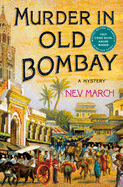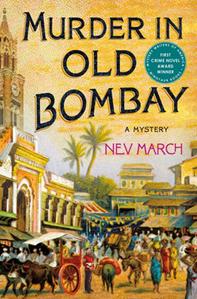
 Mumbai-born debut novelist Nev March raises the specter of a real unsolved case from then-Bombay in this action-filled and richly detailed historical mystery, set in India 1892, under British colonial rule.
Mumbai-born debut novelist Nev March raises the specter of a real unsolved case from then-Bombay in this action-filled and richly detailed historical mystery, set in India 1892, under British colonial rule.
When two young ladies from a prominent Parsee household fall to their deaths from a university clocktower, an investigation fails to prove whether the tragedy stemmed from a suicide pact or foul play. Anglo-Indian Captain James Agnihotri of the Fourteenth Light Dragoons, convalescing in a Poona military hospital after Afghan soldiers ambushed his regiment in Kirachi, finds the case as captivating as the new Sherlock Holmes novel, The Sign of the Four.
After Adi Framji, the husband of one victim and brother of the other, publishes an impassioned letter in the Chronicle of India insisting neither woman would have killed herself, Jim offers his services as a novice investigator to the bereaved family to ease "the sharp burn of his grief." He believes that, by using the Holmesian strategies of disguise and deduction, he can ferret out the truth behind the deaths. The orphaned bastard son of a high-caste mother and an unnamed British father, the captain swiftly becomes attached to the kindly Framjis, seeing them as a surrogate family. However, his investigation becomes more dangerous and difficult than anticipated as Jim navigates the labyrinth of high society in British India, faces attackers sent to scare him off the case and falls hard for Adi's beautiful sister Diana, who has "the spirit of a thoroughbred." The hunt will take the former cavalry officer from glittering ballrooms to far-flung, besieged Lahore, and his interference may make Jim and his adored Framji family a set of powerful enemies.
March has created a likable, honorable sleuth whose humble origins and instinctive kindness make spending time with him a pleasure. A strong case of survivor's guilt and residual wartime trauma play counterpoint to his genial personality. The author sets an immersive scene, creating a detailed representation of the vibrant religious and cultural tapestry of Colonial India and the rigidly structured interlocking hierarchy of British rule and the Indian caste system. Jim's status as an Anglo-Indian frequently illustrates the lack of fluidity in the society; the Framji family are also treated as "neither fully English, nor fully Indian." The story's resolution paves the way for further adventures, which March's readers will surely consider a welcome possibility. --Jaclyn Fulwood, blogger at Infinite Reads
Shelf Talker: Nev March's debut introduces an honorable Anglo-Indian British cavalry officer who tries to solve a possible double murder in 1890s Bombay.

